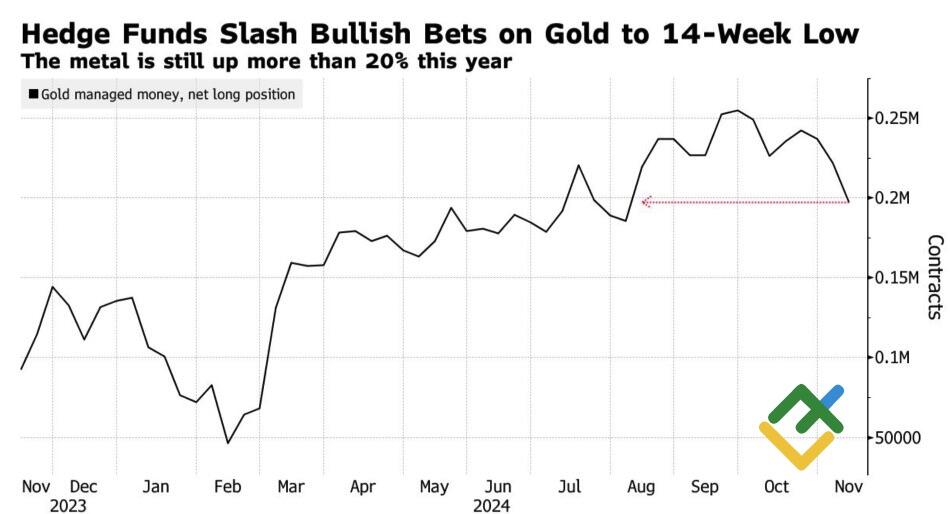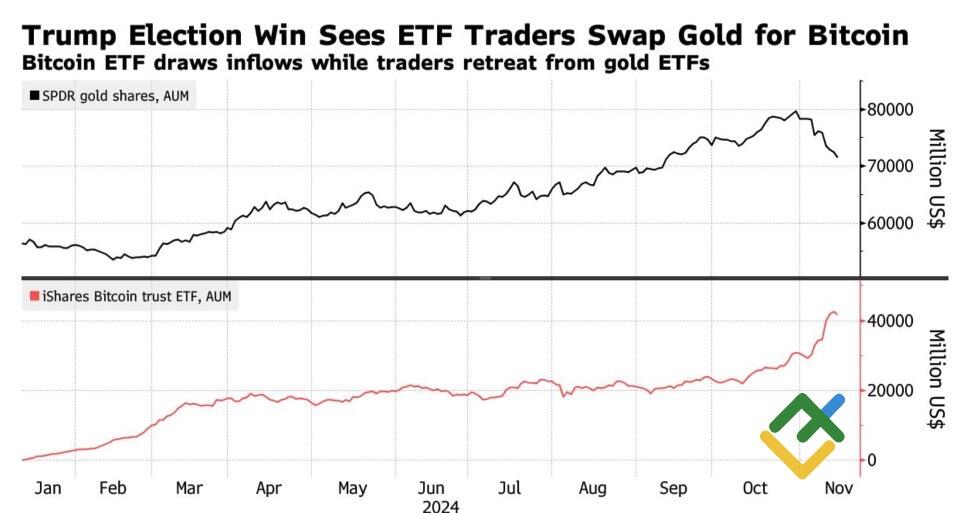
Investors are not concerned about default risk. The strong US dollar is reducing the appeal of gold as an investment, and central banks have ceased purchasing the precious metal. Meanwhile, it is uncertain whether Donald Trump will cease military action in Ukraine. These factors are causing significant volatility in the XAUUSD. Let’s discuss this topic and make a trading plan.
The article covers the following subjects:
Major Takeaways
- The XAUUSD pullback is the result of reduced uncertainty after the US elections.
- The capital outflow to the equity and cryptocurrency markets put pressure on the precious metal.
- Geopolitical factors are still present after Donald Trump’s victory.
- Gold will determine its trajectory after testing $2,635 per ounce.
Weekly Fundamental Forecast for Gold
Since the beginning of the year, the price of gold has increased by 35% to reach an all-time high before declining by 8%. Now, investors are questioning whether the upward trend will resume or if the precious metal is so overvalued that a decline is inevitable.
According to Deutsche Bank, the XAUUSD drop was the deepest one over the past 13 US presidential elections. StoneX notes that gold has fallen in the 12-week period following a vote for head of state on 9 of the 12 previous occasions. This time, weekly outflows from ETFs were the largest since May, with hedge funds actively divesting the asset, bringing stocks to a 3-month bottom.
Speculative Positions on Gold
Source: Bloomberg.
Gold is a safe-haven asset, and demand for it increases as uncertainty grows. The US presidential election created such uncertainty, prompting investors to stick to the “buy the rumor, sell the news” principle. The precious metal is purchased when other assets fall. In this respect, the rapid growth of US stock indices and Bitcoin created a challenging environment for the XAUUSD.
Capital Flows in ETFs
Source: Bloomberg.
Goldman Sachs has reiterated its forecast that gold will surge to $3,000 per ounce, while Deutsche Bank has identified three potential issues that could hurt the upward trajectory of the XAUUSD. Market participants are not unduly concerned about rising budget deficits, government debt, and default risk in the US. Central banks, led by the People’s Bank of China (PBoC), have ceased purchasing precious metals, as they require capital to bolster their currencies. Finally, any unexpected developments in the economy and markets will lead to increased demand for the US dollar.
The primary driver of the 64% rally in XAUUSD quotes from its October 2023 lows was de-dollarization and the related precious metal buying by central banks. The prospect of a swift conclusion to the military conflict in Ukraine has removed a key incentive for investors to buy gold. Therefore, the trading instrument has experienced a pullback. However, the intensification of the conflict, evidenced by the US approval given to Kyiv to use long-range missiles and Moscow’s reluctance to put the conflict on pause, prompted a re-emergence of market optimism, and bulls returned to the market.
As a result, gold finds itself in a state of equilibrium. On the one hand, the robust US dollar, central banks’ support of their currencies, and investors’ inclination towards alternative assets exerted downward pressure on the XAUUSD. At the same time, geopolitical developments have supported gold bulls.
Weekly Trading Plan for Gold
As a result, the risk of consolidation is increasing, and the primary objective is to accurately predict the trading range. The channel between $2,525 and $2,725 per ounce appears to be a suitable one. Should the gold price breach the resistance level of $2635, it would be appropriate to buy the asset with the target at the upper boundary of $2,725. Conversely, a rebound would be a reason to sell towards the lower boundary of $2,525.
Price chart of XAUUSD in real time mode
The content of this article reflects the author’s opinion and does not necessarily reflect the official position of LiteFinance. The material published on this page is provided for informational purposes only and should not be considered as the provision of investment advice for the purposes of Directive 2004/39/EC.
{{value}} ( {{count}} {{title}} )
This post is originally published on LITEFINANCE.







